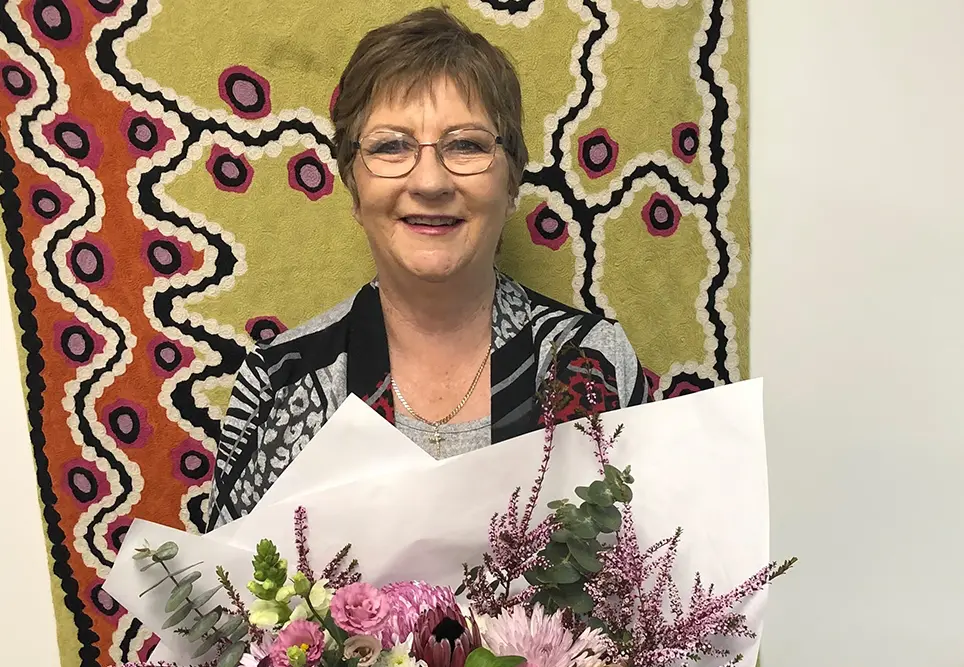
The cover of our CRANAplus Magazine (pictured right) in June 2010 (Issue 78) says it all with membership officer Helen Phipps showing how thrilled she was with the success of the organisation’s membership drive. Less than a year after she took on the role, numbers had swelled from 470 to 900.
Now, in 2024, there are around 2,100 members. And Helen’s mantra is still the same: to support our members and give the personal touch whenever she can.
“I still get satisfaction when I watch the membership grow,” Helen says. “It’s all about building relationships with new and existing members, and reaching out to past members.
“When I started 15 years ago, one of the first tasks for me and my then Manager Anne-Marie Borchers, who advised me to apply for the job, was to ring every single past member of CRANA. Back then, all the names, going back to 1980, were on a hard copy spreadsheet.
“And even now, with every subscription that expires, I retain contact. It’s the personal touch.
“Technology is a wonderful thing, streamlining many services, but the temptation can be to lose that personal touch.
“I email every past member, and it’s not a blanket email, each one focuses on each person.”
Much of Helen’s working day will see her on the other end of the phone or sending emails, helping members access the CRANAplus courses, answering questions and providing information about scholarships and discounts and the Bush Support Line.

“CRANAplus is out there doing important things, constantly improving and opening avenues to help remote health workers not to feel so isolated,” says Helen.
“I appreciate that communication is a barrier in the outback and if that means I have to phone someone back, make specific arrangements to get information to a member, then I will.”
Celebrating 15 years in the job earlier this year, Helen shared a few stories of the early days with her South Australian colleagues: a number of them about the rough conditions in the first SA office, an old house on South Road in the suburb of Mile End, others about their colourful neighbours.
Originally brought in as the receptionist, Helen soon took on the Membership Officer role when that part of the organisation moved from Alice Springs. Her office was in the old kitchen at the back, next to a former sleepout, being used to store the education equipment for the face-to-face workshops.
In one early-days story, Helen recalls a knock at the back door. “There was this gentleman with a lot of gold chains around his neck and slicked-back hair. ‘Can I help you?’, I asked. He looked me up and down and said. ‘I don’t know.’ And the penny dropped. I suggested he knock at the door of the next building: that was the local brothel.” Those neighbours provided quite a few stories.
Helen has seen the organisation grow over the years, not only in memberships, but also the scope of services and its rising status as a major voice in Canberra for remote health workers. The principal reasons for existing are still the same today for CRANAplus: education, advocacy and support.
The expansion of the education arm has seen two moves to new premises to cater for the storage needs for the props and equipment, first to Dudley Park, then to the current premises at Wingfield in the northern suburbs.
Helen’s role has also expanded and she’s is also in charge of scholarship administration and around 60 corporate members and affiliate partners.
“We get 60 new members each month, new remote health workers, people wanting to do a course, coming to the conference, graduate students who apply for scholarships. Of course there are people who move out of remote work as well. But many like to keep in touch with what’s happening, no matter where they now work or have retired.
“I always wanted to be a nurse from the time I was five,” Helen says. “It’s funny where life takes you.
“When I left school, I was too young to go into nursing so I took on office work.” By the time she did get an offer to start nursing training, Helen decided to stick with a steady job and a weekly pay packet.
“I don’t regret that decision,” says Helen.
“I did a good job wherever I worked. I worked in financial institutions, as a teller, a cashier. Most jobs didn’t last much longer than two years.

“But when I got the opportunity to come to CRANAplus in 2009, it felt right. Here was an organisation that wasn’t just about making money, an organisation that treated its staff well. I soon learned the extent of the work that CRANAplus does, and I was a part of that. I loved it then. And I love it now.
“And when I see what nurses do, you know, I don’t think I could have done it anyway. I am so glad I am here. I am helping people, but in a different way, helping people deal with admin and IT.
“In my mind I think how I would feel if I needed advice or support. I give them my time. In remote areas, the phones often don’t work, so, for example, if they need me to ring them back, I understand.”
Thinking about retiring?
“I used to say I wouldn’t think about retiring until I was 75,” says Helen. “I’m now 74. I think I have to rethink that number,” she laughs.
“I will keep on working while I am still healthy.”
